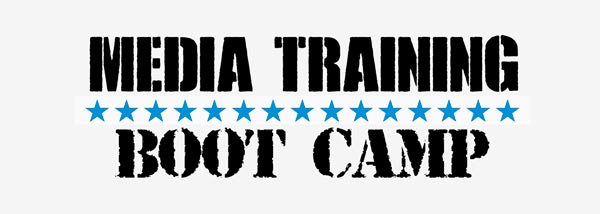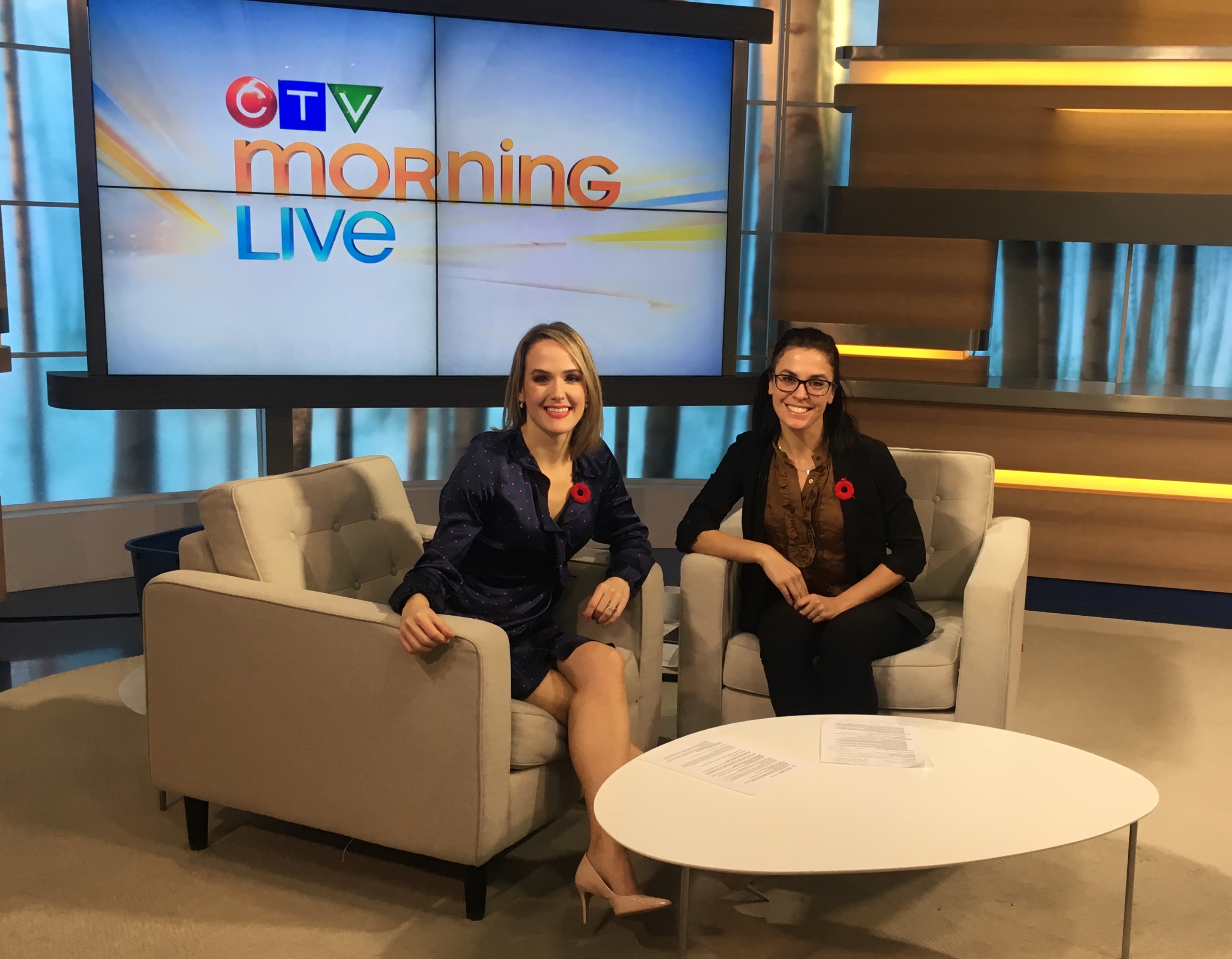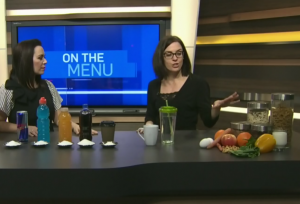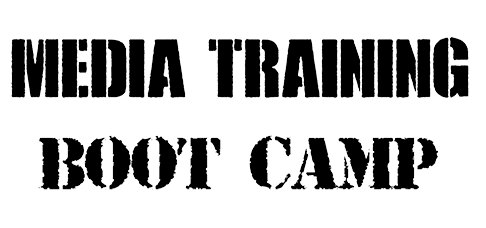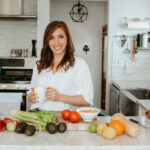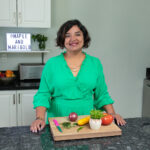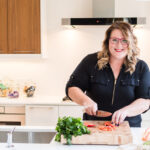We’re excited to introduce you to media savvy registered dietitian Amanda Nash from Winnipeg! Amanda is the Health Promotion and Nutrition Manager with the Heart and Stroke Foundation in Manitoba. She’s passionate about creating supportive environments where the healthy choice becomes the easy choice. She works to coordinate initiatives which create awareness, educate and help prevent or manage risk factors for chronic disease. For the past 8 years, Amanda has worked with the Heart and Stroke Foundation to create awareness around nutrition, educate both professionals and the pubic and inform policy. She enjoys working with the media, individuals, groups and health professionals to promote optimum health at every stage of life and in all health conditions. We’re certain you’ll enjoy learning more about Amanda and will enjoying reading about her media experiences and her tips for your own media success!
How did you get started in the media?
I got started working in media through my role with the Heart and Stroke Foundation. Prior to joining Heart and Stroke, my interest in media was sparked when doing a couple of radio interviews for Nutrition Month promotion, which I really enjoyed. When I was a child I always wanted to have my own cooking show one day, and would practice ‘shows’ for my family. I then forgot about that dream until I joined Heart and Stroke, and they asked me to take over the monthly Breakfast Television segments. I was very lucky to have a communications manager at work who could give me some pointers and also to work with some amazing media dietitians who passed on some of their secrets. As I became more comfortable with it, I took on more and more TV, radio and print media opportunities with my work and volunteer roles.
What was your most memorable moment of your first TV interview and why?
My first TV interview included 2 segments on ‘healthy baking substitutions and a recipe demo’ with Jon Ljungberg on Breakfast Television. He was amazing and made me feel so comfortable. He met me in the green room and sat with me to review my key messages (they don’t always do that and if they do it’s usually about 15 sec before the interview). He even threw on a chef hat and apron without me even asking! We hit every key message, got out all the talking points I wanted to touch on, finished the recipe and laughed a lot. Working with a seasoned pro like Jon made my first few TV appearances a breeze. This allowed me to get comfortable with media and build my confidence before having to do some tougher interviews later in my career. I was very lucky.
Have you ever experienced a “fumble” during an interview, and if so, how did you fix it / what did you learn from it?
There are 2 major ‘fumbles’ that I have had and both ended in lessons learnt. First, was a wording mix up. About 8 years ago, I was doing a TV interview on managing cholesterol. This was back in the day where we strongly encouraged margarine over butter. Growing up, we only used margarine in my house but my parents always called it butter. For whatever reason, while I was doing the interview, my brain reverted back to childhood and without knowing it, I kept using the word ‘butter’ when talking about margarine. I didn’t even realize I was doing this until I watched the segment later that day!!! I was mortified. I talked to a few colleagues about it, realized that the prop was clearly margarine, I only actually mentioned it twice and all the other messages were on point. There was nothing else I could do to change it except to laugh at myself. Now I will never mix up the name of a prop or ingredient again! The second ‘fumble’ was not an actual fumble at all, but a very good lesson learnt. I had already done a few evening news segments, so I knew they would only take a few sound bites from the 5 minutes interview, but what I didn’t know was that they could clip your sentences to make it sound like you said something you didn’t. This evening news segment with a brand new news anchor and was on one of the fad diets of the time. I talked about the harms of dieting, sustainability and what healthy eating should look like. When I watched the segment on the news that evening, it was clear this reporter was biased and was promoting the diet. He clipped my contributions to make me sound like I was fumbling and unsure of myself. Then had a doctor (what kind of doctor I am not sure) over skype say ‘this dietitian clearly doesn’t know what she is talking about’. I was furious! I wanted to call the station and complain. I calmed down and realized I couldn’t control what the reporter did, but I could ensure I do my due diligence moving forward. I now ensure that I have a good conversation with the producer or host booking me and discuss not only the types of questions they would be asking but also the intent of the interview. I also ensure both the producer as well as the reporter know my key messages. Instead of letting this experience scare me away from ‘newsy’ segments, it allowed me to change my approach to preparing and recognize the difference between doing a TV interview for a morning show and for evening news. I have never had this issue again and I don’t know what happened, but that reporter is no longer on the air.
Can you share at least one tip or a nugget of advice for dietitians who would like to work / who are working in the media?
I always write out my top 3 key messages and a few supporting comments/stats/facts in plain, simple language. I provide those to the producer and reporter to ensure they know what we are talking about and help to keep the flow. Then I fill in the rest on the spot. During the interview I try and use positive language, for example, instead of saying “that’s not true’” I would say “actually, evidence supports… OR when you look at the facts, it shows that…”. I also try to use bridging words to keep on focus, for example, ”I have heard that too, but the real focus should be… OR The real question should be… OR what concerns me more is…”. When in doubt, repeat your key messages, even if it doesn’t completely follow where the reporter is taking the conversation. Finally and most importantly, be yourself and your passion will not only show but engage the audience. When I first started I was felt very ‘dry’ because my mind was constantly thinking of the next stat or fact to share. Then I realized, I was the nutrition expert and I know my stuff. By being myself and staying in the moment, the interview is much more effective than if I was trying to be too scripted.
A little bit more about Amanda:
In addition to being a Registered Dietitian with a Bachelor of Nutritional Sciences Amanda also has a Certificate in Adult Education. In her free time she teaches cooking classes called ‘Cook Club’ with the goal of bringing people together to prepare simple nutritious recipes, learn new cooking tips and tricks and increase participants comfort in the kitchen. Amanda likes sharing her knowledge of nutrition, food, and health behaviors in order to help others maximize their wellbeing and increase their quality of life.
To contact Amanda or follow her on social media:
Email: amanda.nash@heartandstroke.ca
Twitter: @AmandaNash_RD
